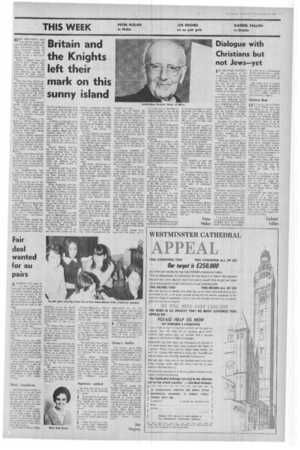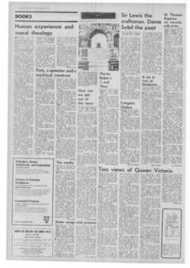Page 3, 27th October 1972
Page 3

Report an error
Noticed an error on this page?If you've noticed an error in this article please click here to report it.
Tags
Share
Related articles
As The Church-state Conflict Intensifies In Malta...
Maltese Hopes For Settlement Still High
Malta Shake-up Will Follow Mintoff Election Success
Mgr. Gonzi Lifts Interdict From Dom Mintoff
Going Away Malta
Britain and the Knights left their mark on this sunny island
DOM MINTOFF'S clash
with Britain earlier this year sent Malta's 'tourist earnings plummeting. but the warm welcome which the Maltese today extend to British visitors is fast reversing this trend.
When I stepped from the plane at Luqa Airport, near Valletta the capital of the George Cross island, my first impression of the dry and rocky landscape was that it resembled the hills around Jerusalem, or perhaps Southern Italy.
Then, like every British visitor, I noticed something somehow "wrong". The cars hooting their way between the domed and thick walled houses were English-made and drove on the left. And then I saw my first red telephone kiosk another British import.
This British, yet not British. quality — the latter emphasised by a language which goes "Mgarr ix-Xini" characterises the whole island and makes it especially attractive for British people.
A similar ambiguity is reflected in Maltese opinion of Dom Mintoft and his oriental "brinkmanship" tactics which successfully gained more income for Malta while risking the British connection.
A typical opinion expressed by someone in the business tp community was that he did not support Dom Mintoff, but said: -1 he Prime Minister was justified in what he did, Malta deserves better treatment from Britain."
An Irish priest whose church is attended by many of the British colony resident in Malta described some of his parishioner: as being "scared out of their minds during the crisis for no reason at all."
One Englishwoman had .complained to him that "we cannot even talk in the street" which he said was absolutely untrue.
The priest said one of the reasons for the British colony's self-willed segregation from the Maltese, most of whom spoke perfect English, was that many went there to retire at about the age of 60 and were really too old to integrate with the community.
a, An incident involving British
-r residents illustrates both the very smallness of the island it has a population of 330,000 and is only 17 miles across at its widest point — and nationalist sensitivity.
British residents helped the Blue Sisters, who run one of Malta's best hospitals, by or
• ganising a trolley which was wheeled round the 'wards with artcles the patients could buy.
The Prime Minister heard of it, and orders came directly from Government House that the service must cease. The Maltese could take care of themselves.
In Malta, as in Ireland, much that is specifically Maltese is also religious — and religion and culture arc inextricably knit together. Malta has been Catholic since St. Paul was shipwrecked there in A.D. 60, and few views in the island are without the dome of a large Church in a central position.
Several Maltese described the Prime Minister and the island's spiritual head, Archbishop Gonzi, as fervent patriots out of the same mould, agreeing about the ends of policy but differing greatly about the means needed to achieve them.
Archbishop and Prime Minister have already fought in the past on the issue of divorce, but Dom Mintoff's electoral success could not have been achieved in the face of clerical opposition.
While bargaining with Britain Dorn Mintoff threatened to ally himself with President Ghadaffy of Libya. a fanatical believer in Islam who has tried to remodel the laws of his country directly on the Koran. This has resulted in thieves having their limbs cut off and suffering other primitive punishments, long abandoned by other Arab countries, Libya faces Malta over 200 miles of Mediterranean. Some of its better-off citizens have begun visiting Malta "for drink and prostitutes," according to the Maltese. Both are illegal under the Ghadaffy regime.
Few Libyans were to be seen there this month and the
Maltese complained that Libyan currency restrictions greatly curtailed the visitors spending.
In the days when the British and American navies were more frequent visitors to the island. a "red light" area flourished off Valletta's Grand Harbour in a street called "Straight" — best known as "The Gut".
Of late, business has greatly contracted. The liveliest activity visible late one Saturday night this month were drunken young British sailors being escorted into paddy-wagons by burly British Navy police.
The Maltese people and their language are a mixture of the many nations who have invaded their island. which straddles vital Mediterranean trading routes.
The stocky, dark-haired islanders are generally shorter than the British and endowed with a deep tan by an almost perfect climate — rarely colder than 60 degrees Fahrenheit or hotter than 75.
The island has impressive prehistoric temples with evidence of a highly sophisticated civilisation and a religion embodied in broad-hipped statues of fertility goddesses, a physical feature which still distinguishes most Maltese women today.
Used by the Phoenicians as a trading centre and later taken over by the Moslems, Malta was ruled for 200 years by the Knights of St. John, who occupied it after they were expelled from Rhodes by the Moslems in 1522.
Valletta was built by the Knights and called after La Valette, a Grand Master of the Order who successfully held the island against a Turkish force which outnumbered the
Knights ten to one.
One can still admire the massive bastions and walls overlooking Grand Harbour, a breath-taking sight, rarely without a warship swinging at anchor. The town and the island generally are full of medieval remains and Renaissance palaces, or auherges t jilt bi the knights who were divided into groups by nationality and all of noble blood.
The historian Edward Gibbon said of the knights: "They neglected to live but were prepared to die in the service of Christ."
Courageous defenders of Christendom in the face of the Moslem threat, they were often ruthless in their treatment of the Maltese. and Machiavelli could have taught them little in the art of intrigue.
The knights have an ambassador at the Vatican today and a knowledge of their history really brings old Malta to life for the visitor.
Catholics will notice some churches carry a "Moral Film Guide" warning the faithful about films which contain "displays of unnecessary nudity and excessive violence." Striptease is banned in the island.
In the buses, a large inscription behind the bus driver reads: "Mother of God, Pray for us." Anyone who has had a hair-raising journey through Malta traffic is likely to value the suggestion!
Less than three hours and said the signpost at Luqa Airport — 1,306 miles from London. Malta and the nearby islands of Gozo and Comino are one of the few places where English is spoken in the sun all the year round.
The islands already have more than 100 hotels. but so
far could not be described as commercialised. A car can be hired for £2 or less a day. Food is good. Beaches lace the coast — many of them free. No place is much farther than five miles from the sea.
There are innumerable places worth visiting, from grim underground Stone Age. places of sacrifice to the museum containing the finely wrought armour and weapons of the knights of Malta.
Everybody is willing to talk to you, and many have been outside the island, often as members of the British Forces.
Malta is famed for its fine lace, has in recent years opened a glass factory producing some very handsome and inexpensive vases and bowls and boasts intricate filigree work in silver and gold.
Its better local wines are excellent. and for those who enjoy seafood, swardfisa steak and lampaki, a small Mediterranean fish, are both delicious.
One of Malta's radio channels carries the foreign service of the BBC and I spent one breakfast-time listening to a learned talk on Gaelic as spoken in the Hebrides.
But soccer proves an even greater source of British influence. and the young people of the island are almost equally divided between supporters of British soccer teams, whose photographs hang in many bars. and Italian teams. By nature a very stable people, a teacher told me the Maltese get emotional only about sport. politics and religion.
Relations with Britain having improved, Malta has now enter
ed the growing field of "weekend in the sun" holiday places. Cadogan Travel of Sloane Street, London, offer threenight "all-in" holidays from £38, and a week in winter costs as little as £45.
A relatively late arrival in the tourist market, Malta was able to benefit by building hotels both easy on the eye and catering for the traveller's every comfort including quiet bars where one can be astonished at the cheap price of drinks.
The Corinthia Palace in Attard served excellent meals whenever one dragged oneself away from its swimming pools or bedrooms complete with individually adjustable air conditioning.
For breakfast in bed, one simply ticked off what one wanted on a printed list and hung it outside the bedroom door.
I also had excellent meals at the Phoenicia. one of the island's older hotels, situated at the gates of Valletta, with a view over the harbour, set in seven acres of landscaped ground.
The Golden Sands, in the north-west of the Island. also offers good food in a lovely coastal setting. the proprietor buying his own grapes to make wine for his guests.
The Grand Verdala, Malta's most luxurious hotel, built near Mdina at a cost of over £2 million, has a splendid interior designed by the Italian architect Busrivici.
Peter
Nolan
blog comments powered by Disqus











